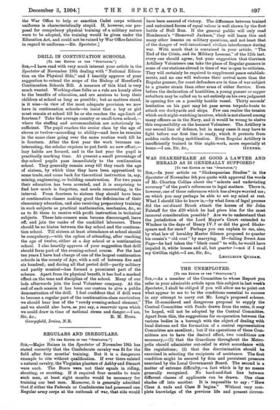Srn,—Major Baines in the Spectator of November 19th has stated
correctly that the Confederate cavalry was fit for the field after four months' training. But it is a dangerous example to cite without qualification. If ever there existed a natural cavalry, the Virginian planters of Ashby and Steuart were such. The Boers were not their equals in riding, shooting, or scouting. If it required four months to train such men, at least eight months would be necessary for training our best men. Moreover, it is generally admitted that if either the Federals or Confederates had possessed one Regular army corps at the outbreak of war, that side would have been assured of victory. The difference between trained and untrained forces of equal valour is well shown by the first battle of Bull Run. If the general public will only read Henderson's "Stonewall Jackson," they will learn this and many other lessons on military questions, and not least that of the danger of well-intentioned civilian interference during war. With much that is contained in your article, "The End of the Crisis, and its Military Lessons," of the 12th inst. every one should agree; but your suggestion that Garrison Artillery Volunteers can take the place of Regular gunners in some of our stations abroad in time of war is open to criticism. They will certainly be required to supplement peace establish- ments, and no one will welcome their arrival more than the Regular gunner, for coast defenders are in time of war subject to a greater strain than other arms of either Service. Even before the declaration of hostilities, a young gunner or sapper subaltern may be called on to act entirely on his own judgment in opening fire on a possibly hostile vessel. Thirty seconds' hesitation on his part may let pass seven torpedo-boats to attack our dockyards and ships. Few can realise the tension which such night-watching involves, which is not shared among many officers as in the Navy, and it would be wrong to shelve this responsibility on the keenest Volunteer. The Artillery is our second line of defence, but in many cases it may have to fight before our first line is ready, which it protects from sudden raids during mobilisation. Even Regular Artillery is insufficiently trained in this night-work, more especially at home.—I am, Sir, &c., GnNarza.






































































 Previous page
Previous page